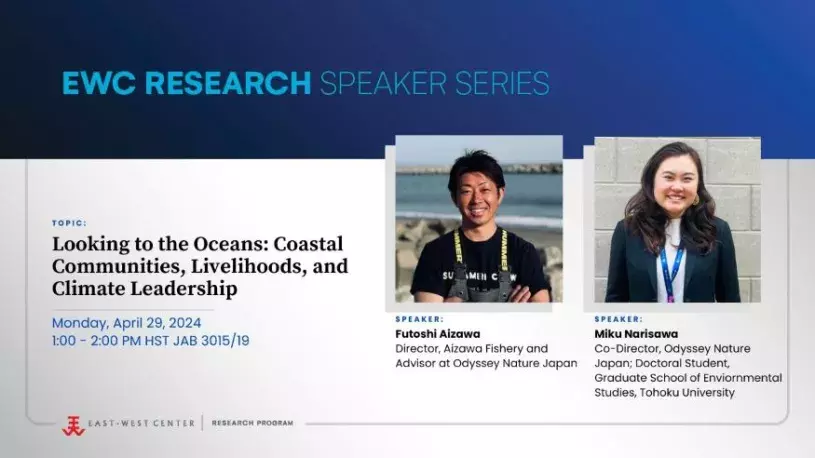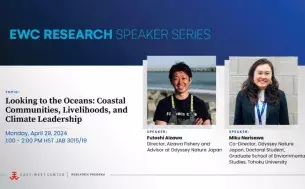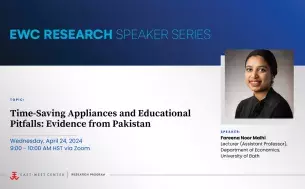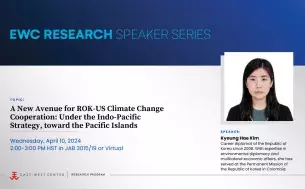Error message

OFFICE/DEPARTMENT
EWC Research Speaker Series
Monday, April 29, 2024
1:00 - 2:00 p.m. HST
Looking to the Oceans: Coastal Communities, Livelihoods, and Climate Leadership
featuring
Ms. Miku Narisawa,
Co-Director, Odyssey Nature Japan; Doctoral Student, Graduate School of Environmental Studies, Tohoku University
&
Mr. Futoshi Aizawa,
Director, Aizawa Fishery; Advisor, Odyssey Nature Japan
From mountains to the sea, Japan is an island nation rich in natural resources. Across Japan, regions cultivate their own identity, and along coastlines Japanese fisherfolk have cultivated thriving fisheries and seaweed industries. The history of seaweed cultivation has deep connections with cultural practices and has also underpinned a core element of the Japanese food economy. However, environmental and climate changes are changing the terms of conventional fishing systems and demanding new innovations. This presentation will explore the various perspectives of local seaweed fishermen who interact daily with the ocean. Specifically, we examine the ways coastal communities are establishing new environmental ethics towards the ocean by adapting to new stressors and rising to meet new opportunities. We thus highlight ways locally situated and nature-centered ethical practices around values of responsibility, understanding, solidarity, and coexistence chart new pathways for climate leadership.
Ms. Miku Narisawa is a co-director at Odyssey Nature Japan, a nature-based program in her hometown in Miyagi prefecture and is currently a doctoral student at the Graduate School of Environmental Studies, Tohoku University, where she focuses on marine environmental anthropology and environmental ethics of coastal resource management. Miku received her M.A. in Peace and Environment from Meiji University and her B.A. in Peace and Conflict Resolution from the University of Hawaiʻi at Mānoa in Honolulu, Hawaiʻi. She has also worked on international peace education projects at the Pearl Harbor National Memorial and has been involved in nature and global education programs through the Lōkahi Foundation in Honolulu, Hawaiʻi.
Mr. Futoshi Aizawa is the Director at Aizawa Fishery and Advisor at Odyssey Nature Japan. Futoshi is a third-generation seaweed (nori) fisherman and has been working in the fishery industry for over 25 years in his hometown, Higashimatsushima City, Miyagi Prefecture. His seaweed has been presented to the Imperial Family twice after winning a national competition at the youngest age for its quality. As a fisherman who has dedicated his life to the ocean, he has always had a passion for marine education and ocean conservation. He has presented in many conferences and workshops domestically and abroad, sharing his wealth of experiences as a fisherman in Japan.
The views expressed are those of the speakers and do no necessarily reflect East-West Center policies or positions.
EWC Research Speaker Series
Monday, April 29, 2024
1:00 - 2:00 p.m. HST
Looking to the Oceans: Coastal Communities, Livelihoods, and Climate Leadership
featuring
Ms. Miku Narisawa,
Co-Director, Odyssey Nature Japan; Doctoral Student, Graduate School of Environmental Studies, Tohoku University
&
Mr. Futoshi Aizawa,
Director, Aizawa Fishery; Advisor, Odyssey Nature Japan
From mountains to the sea, Japan is an island nation rich in natural resources. Across Japan, regions cultivate their own identity, and along coastlines Japanese fisherfolk have cultivated thriving fisheries and seaweed industries. The history of seaweed cultivation has deep connections with cultural practices and has also underpinned a core element of the Japanese food economy. However, environmental and climate changes are changing the terms of conventional fishing systems and demanding new innovations. This presentation will explore the various perspectives of local seaweed fishermen who interact daily with the ocean. Specifically, we examine the ways coastal communities are establishing new environmental ethics towards the ocean by adapting to new stressors and rising to meet new opportunities. We thus highlight ways locally situated and nature-centered ethical practices around values of responsibility, understanding, solidarity, and coexistence chart new pathways for climate leadership.
Ms. Miku Narisawa is a co-director at Odyssey Nature Japan, a nature-based program in her hometown in Miyagi prefecture and is currently a doctoral student at the Graduate School of Environmental Studies, Tohoku University, where she focuses on marine environmental anthropology and environmental ethics of coastal resource management. Miku received her M.A. in Peace and Environment from Meiji University and her B.A. in Peace and Conflict Resolution from the University of Hawaiʻi at Mānoa in Honolulu, Hawaiʻi. She has also worked on international peace education projects at the Pearl Harbor National Memorial and has been involved in nature and global education programs through the Lōkahi Foundation in Honolulu, Hawaiʻi.
Mr. Futoshi Aizawa is the Director at Aizawa Fishery and Advisor at Odyssey Nature Japan. Futoshi is a third-generation seaweed (nori) fisherman and has been working in the fishery industry for over 25 years in his hometown, Higashimatsushima City, Miyagi Prefecture. His seaweed has been presented to the Imperial Family twice after winning a national competition at the youngest age for its quality. As a fisherman who has dedicated his life to the ocean, he has always had a passion for marine education and ocean conservation. He has presented in many conferences and workshops domestically and abroad, sharing his wealth of experiences as a fisherman in Japan.
The views expressed are those of the speakers and do no necessarily reflect East-West Center policies or positions.









